- Home
- William Shakespeare
The Winter's Tale Page 4
The Winter's Tale Read online
Page 4
By any understanding pate259 but thine?
For thy conceit is soaking260, will draw in
More than the common blocks261. Not noted, is't,
But of262 the finer natures? By some severals
Of head-piece263 extraordinary? Lower messes
Perchance are to this business264 purblind? Say.
CAMILLO Business, my lord? I think most understand
Bohemia stays here longer.
LEONTES Ha?
CAMILLO Stays here longer.
LEONTES Ay, but why?
CAMILLO To satisfy your highness and the entreaties
Of our most gracious mistress.
LEONTES Satisfy272?
Th'entreaties of your mistress? Satisfy?
Let that suffice. I have trusted thee, Camillo,
With all the nearest things to my heart, as well275
My chamber-councils276, wherein, priest-like, thou
Hast cleansed my bosom277, I from thee departed
Thy penitent reformed. But we278 have been
Deceived in thy integrity, deceived
In that which seems so.
CAMILLO Be it forbid, my lord!
LEONTES To bide282 upon't, thou art not honest: or,
If thou inclin'st that way, thou art a coward,
Which hoxes284 honesty behind, restraining
From course required: or else thou must be counted285
A servant grafted286 in my serious trust
And therein negligent: or else a fool
That see'st a game288 played home, the rich stake drawn,
And tak'st it all for jest.
CAMILLO My gracious lord,
I may be negligent, foolish and fearful.
In every one of these no man is free,
But that his negligence, his folly, fear,
Among the infinite doings of the world,
Sometime puts forth. In your affairs, my lord,
If ever I were wilful-negligent296,
It was my folly: if industriously
I played the fool, it was my negligence,
Not weighing299 well the end: if ever fearful
To do a thing, where I the issue300 doubted,
Whereof the execution did cry out
Against the non-performance301, 'twas a fear
Which oft infects the wisest. These, my lord,
Are such allowed infirmities that honesty
Is never free of. But, beseech your grace,
Be plainer with me. Let me know my trespass306
By its own visage307; if I then deny it,
'Tis none of mine.
LEONTES Ha' not you seen, Camillo --
But that's past doubt, you have, or your eye-glass310
Is thicker than a cuckold's horn -- or heard --
For to a vision so apparent312 rumour
Cannot be mute -- or thought -- for cogitation313
Resides not in that man that does not think --
My wife is slippery315? If thou wilt confess,
Or else be impudently negative,
To316 have nor eyes nor ears nor thought, then say
My wife's a hobby-horse318, deserves a name
As rank319 as any flax-wench that puts to
Before her troth-plight: say't and justify't.
CAMILLO I would not be a stander-by to hear
My sovereign mistress clouded322 so, without
My present323 vengeance taken. 'Shrew my heart,
You never spoke what did become324 you less
Than this; which to reiterate were sin
As deep as that, though true325.
LEONTES Is whispering nothing?
Is leaning cheek to cheek? Is meeting noses?
Kissing with inside lip? Stopping the career329
Of laughter with a sigh -- a note infallible330
Of breaking honesty331? Horsing foot on foot?
Skulking in corners? Wishing clocks more swift?
Hours333, minutes? Noon, midnight? And all eyes
Blind with the pin and web334 but theirs, theirs only,
That would unseen be wicked? Is this nothing?
Why then the world and all that's in't is nothing:
The covering sky is nothing, Bohemia is nothing,
My wife is nothing338, nor nothing have these nothings,
If this be nothing.
CAMILLO Good my lord, be cured
Of this diseased opinion, and betimes341.
For 'tis most dangerous.
LEONTES Say it be, 'tis true.
CAMILLO No, no, my lord.
LEONTES It is. You lie, you lie.
I say thou liest, Camillo, and I hate thee,
Pronounce thee a gross lout, a mindless slave,
Or else a hovering temporizer348, that
Canst with thine eyes at once see good and evil,
Inclining to them both. Were my wife's liver350
Infected as her life, she would not live
The running of one glass352.
CAMILLO Who does infect her?
LEONTES Why, he that wears her like her medal354, hanging
About his neck, Bohemia: who, if I
Had servants true about me that bare356 eyes
To see alike mine honour as their profits,
Their own particular thrifts358, they would do that
Which should undo359 more doing. Ay, and thou,
His cupbearer360 -- whom I from meaner form
Have benched361 and reared to worship, who mayst see
Plainly as heaven sees earth and earth sees heaven,
How I am galled363 -- mightst bespice a cup
To give mine enemy a lasting wink364,
Which draught to me were cordial365.
CAMILLO Sir, my lord,
I could do this, and that with no rash367 potion,
But with a ling'ring dram368 that should not work
Maliciously369 like poison. But I cannot
Believe this crack370 to be in my dread mistress,
So sovereignly being honourable.
I have loved thee--
LEONTES Make that thy question, and go rot!373
Dost think I am so muddy374, so unsettled,
To appoint myself in this vexation375, sully
The purity and whiteness of my sheets --
Which to preserve is sleep377, which being spotted
Is goads, thorns, nettles, tails of wasps --
Give scandal to the blood379 o'th'prince my son --
Who I do think is mine and love as mine --
Without ripe moving to't381? Would I do this?
Could man so blench382?
CAMILLO I must believe you, sir.
I do, and will fetch off384 Bohemia for't,
Provided that when he's removed, your highness
Will take again your queen as yours at first,
Even for your son's sake, and thereby for sealing
The injury of tongues387 in courts and kingdoms
Known and allied to yours.
LEONTES Thou dost advise me
Even so as I mine own course have set down390.
I'll give no blemish to her honour, none.
CAMILLO My lord,
Go then; and with a countenance394 as clear
As friendship wears at feasts, keep395 with Bohemia
And with your queen. I am his cupbearer:
If from me he have wholesome beverage,
Account me not your servant.
LEONTES This is all.
Do't and thou hast the one half of my heart;
Do't not, thou splitt'st thine own.
CAMILLO I'll do't, my lord.
LEONTES I will seem friendly, as thou hast advised me.
Exit
CAMILLO O miserable404 lady! But, for me,
What case405 stand I in? I must be the poisoner
Of good Polixenes, and my ground406 to do't
Is the obedience to a master; one
&nbs
p; Who, in rebellion with himself408, will have
All that are his so too409. To do this deed,
Promotion follows. If410 I could find example
Of thousands that had struck anointed kings
And flourished after, I'd not do't. But since
Nor brass nor stone nor parchment413 bears not one,
Let villainy itself forswear't. I must
Forsake the court. To do't, or no, is certain
To me a break-neck416. Happy star, reign now!
Here comes Bohemia.
Enter Polixenes
POLIXENES This is strange. Methinks
Aside
My favour here begins to warp419. Not speak?--
Good day, Camillo.
CAMILLO Hail, most royal sir!
POLIXENES What is the news i'th'court?
CAMILLO None rare423, my lord.
POLIXENES The king hath on him such a countenance
As425 he had lost some province and a region
Loved as he loves himself. Even now I met him
With customary compliment427, when he,
Wafting his eyes to th'contrary428 and falling
A lip of much contempt, speeds from me and
So leaves me to consider what is breeding
That changes thus his manners.
CAMILLO I dare not know, my lord.
POLIXENES How, dare not? Do not? Do you know, and dare not?
Be intelligent434 to me. 'Tis thereabouts.
For, to yourself, what you do know, you must435,
And cannot say you dare not. Good Camillo,
Your changed complexions437 are to me a mirror
Which shows me mine changed too, for I must be
A party in this alteration, finding
Myself thus altered with't.
CAMILLO There is a sickness
Which puts some of us in distemper442, but
I cannot name the disease, and it is caught
Of444 you that yet are well.
POLIXENES How, caught of me?
Make me not sighted like the basilisk446.
I have looked on thousands who have sped447 the better
By my regard448, but killed none so. Camillo --
As you are certainly a gentleman, thereto
Clerk-like450 experienced, which no less adorns
Our gentry451 than our parents' noble names,
In whose success452 we are gentle -- I beseech you,
If you know aught453 which does behove my knowledge
Thereof to be informed, imprison't not
In ignorant concealment.
CAMILLO I may not answer.
POLIXENES A sickness caught of me, and yet I well?
I must be answered. Dost thou hear, Camillo,
I conjure459 thee, by all the parts of man
Which honour does acknowledge, whereof the least
Is not this suit460 of mine, that thou declare
What incidency462 thou dost guess of harm
Is creeping toward me; how far off, how near,
Which way to be prevented, if to be.
If not, how best to bear it.
CAMILLO Sir, I will tell you,
Since I am charged467 in honour and by him
That I think honourable: therefore mark468 my counsel,
Which must be ev'n469 as swiftly followed as
I mean to utter it; or both yourself and me
Cry lost, and so goodnight471!
POLIXENES On, good Camillo.
CAMILLO I am appointed him473 to murder you.
POLIXENES By whom, Camillo?
CAMILLO By the king.
POLIXENES For what?
CAMILLO He thinks, nay, with all confidence he swears,
As he had seen't or been an instrument
To vice479 you to't, that you have touched his queen
Forbiddenly.
POLIXENES O, then my best blood turn
To an infected jelly and my name
Be yoked with his that did betray the best483!
Turn then my freshest reputation to
A savour485 that may strike the dullest nostril
Where I arrive, and my approach be shunned,
Nay, hated too, worse than the great'st infection
That e'er was heard or read!
CAMILLO Swear his thought over489
By each particular star in heaven and
By all their influences491; you may as well
Forbid the sea for to492 obey the moon
As or493 by oath remove or counsel shake
The fabric494 of his folly, whose foundation
Is piled upon his faith and will continue
The standing of his body496.
POLIXENES How should this grow497?
CAMILLO I know not. But I am sure 'tis safer to
Avoid what's grown than question how 'tis born.
If therefore you dare trust my honesty,
That lies enclosed in this trunk501 which you
Shall bear along impawned502, away tonight!
Your followers I will whisper to503 the business,
And will by twos and threes at several posterns504
Clear them505 o'th'city. For myself, I'll put
My fortunes to your service, which are here
By this discovery lost506. Be not uncertain,
For by the honour of my parents, I
Have uttered truth, which if you seek to prove509,
I dare not stand by510; nor shall you be safer
Than one condemned by the king's own mouth,
Thereon his execution sworn.
POLIXENES I do believe thee:
I saw his heart in's face. Give me thy hand.
Be pilot515 to me and thy places shall
Still neighbour mine. My ships are ready and
My people did expect my hence departure517
Two days ago. This jealousy
Is for a precious creature: as she's rare,
Must it be great, and as his person's mighty,
Must it be violent, and as he does conceive
He is dishonoured by a man which ever
Professed523 to him, why, his revenges must
In that be made more bitter. Fear o'ershades me.
Good expedition525 be my friend, and comfort
The gracious queen, part of his theme526, but nothing
Of his ill-ta'en527 suspicion. Come, Camillo.
I will respect thee as a father if
Thou bear'st my life off hence. Let us avoid529.
CAMILLO It is in mine authority to command
The keys of all the posterns. Please your highness
To take the urgent hour. Come, sir, away.
Exeunt
Act 2 Scene 1 running scene 2
* * *
Enter Hermione, Mamillius, Ladies
HERMIONE Take the boy to you. He so troubles me,
'Tis past enduring.
FIRST LADY Come, my gracious lord,
Takes Mamillius
Shall I be your playfellow?
MAMILLIUS No, I'll none of5 you.
FIRST LADY Why, my sweet lord?
MAMILLIUS You'll kiss me hard and speak to me as if
I were a baby still.-- I love you better.
To Second Lady
SECOND LADY And why so, my lord?
MAMILLIUS Not for because10
Your brows are blacker -- yet black brows, they say,
Become so12 me women best, so that there be not
Too much hair there, but in a semicircle
Or a half-moon made with a pen.
SECOND LADY Who taught 'This15?
MAMILLIUS I learned it out of women's faces. Pray now
What colour are your eyebrows?
FIRST LADY Blue, my lord.
MAMILLIUS Nay, that's a mock. I have seen a lady's nose
That has been blue, but not her eyebrows.
FIRST LADY Hark ye.
The queen y
our mother rounds apace22. We shall
Present our services to a fine new prince
One of these days, and then you'd wanton with us24,
If we would have you.
SECOND LADY She is spread of late
Into a goodly bulk. Good time encounter her!27
HERMIONE What wisdom stirs amongst you? Come, sir, now
I am for29 you again. Pray you sit by us,
And tell's a tale.
MAMILLIUS Merry or sad31 shall't be?
HERMIONE As merry as you will.
MAMILLIUS A sad tale's best for winter. I have one
Of sprites34 and goblins.
HERMIONE Let's have that, good sir.
Come on, sit down. Come on, and do your best
To fright me with your sprites. You're powerful at it.
MAMILLIUS There was a man--
HERMIONE Nay, come, sit down, then on.
MAMILLIUS Dwelt by a churchyard -- I will tell it softly.
Sits
Yond crickets41 shall not hear it.
HERMIONE Come on, then, and give't me in mine ear.
They talk apart
[Enter Leontes, Antigonus, Lords and others]
LEONTES Was he met there? His train? Camillo with him?
A LORD Behind the tuft44 of pines I met them. Never
Saw I men scour45 so on their way: I eyed them
Even46 to their ships.
LEONTES How blest am I
In my just censure48, in my true opinion!
Alack, for lesser knowledge! How accursed
In being so blest! There may be in the cup
A spider steeped51, and one may drink, depart,
And yet partake no venom, for his knowledge
Is not infected50: but if one present
Th'abhorred ingredient to his eye, make known
How he hath drunk, he cracks his gorge55, his sides,
With violent hefts56. I have drunk, and seen the spider.
Camillo was his help in this, his pander57.
There is a plot against my life, my crown.
All's true that is mistrusted59. That false villain
Whom I employed was pre-employed by him.
He has discovered my design, and I
Remain a pinched62 thing; yea, a very trick
For them to play at will. How came the posterns
So easily open?
A LORD By his great authority,
Which often hath no less prevailed than so
On your command.
LEONTES I know't too well.--
Give me the boy. I am glad you did not nurse69 him.
To Hermione
Though he does bear some signs of me, yet you
Have too much blood in him.
HERMIONE What is this? Sport?72
LEONTES Bear the boy hence. He shall not come
To a Lord or Lady
about her.
Away with him, and let her sport74 herself
With that she's big with,-- for 'tis Polixenes
To Hermione
Has made thee swell thus.
[The Lord or Lady exits with Mamillius]
HERMIONE But I'd say he had not;
And I'll be sworn you would believe my saying,
Howe'er you lean to th'nayward79.
LEONTES You, my lords,
Look on her, mark her well. Be but about
To say 'She is a goodly lady', and
The justice83 of your hearts will thereto add
''Tis pity she's not honest84, honourable.'
Praise her but for this her without-door85 form,
Which on my faith deserves high speech, and straight86

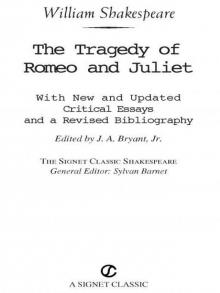 Romeo and Juliet
Romeo and Juliet As You Like It (Folger Shakespeare Library)
As You Like It (Folger Shakespeare Library)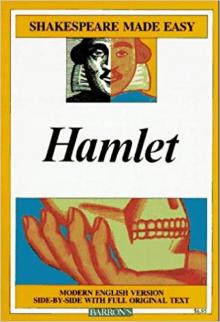 Hamlet
Hamlet Richard II (Folger Shakespeare Library)
Richard II (Folger Shakespeare Library) Macbeth
Macbeth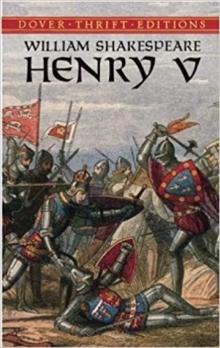 Henry V
Henry V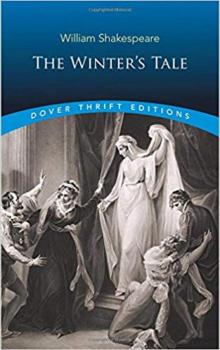 The Winter's Tale
The Winter's Tale The Taming of the Shrew
The Taming of the Shrew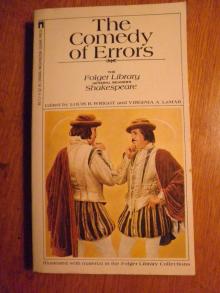 The Comedy of Errors
The Comedy of Errors King Lear (Folger Shakespeare Library)
King Lear (Folger Shakespeare Library)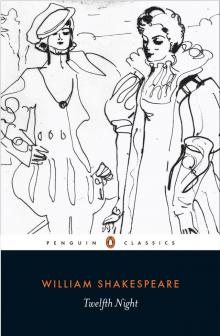 Twelfth Night
Twelfth Night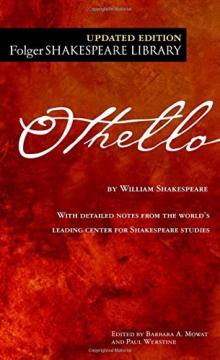 Othello
Othello The Two Gentlemen of Verona
The Two Gentlemen of Verona Henry IV, Part 1 (Folger Shakespeare Library)
Henry IV, Part 1 (Folger Shakespeare Library) King John/Henry VIII (Signet Classics)
King John/Henry VIII (Signet Classics)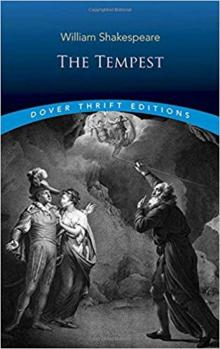 The Tempest
The Tempest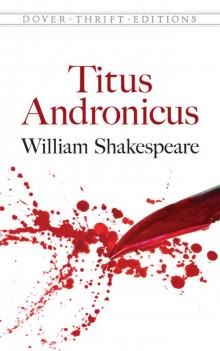 Titus Andronicus (Dover Publications)
Titus Andronicus (Dover Publications)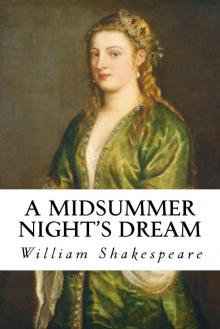 A Midsummer Night's Dream
A Midsummer Night's Dream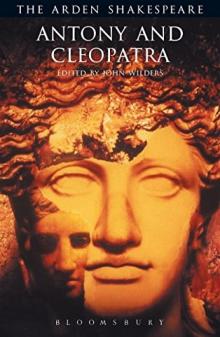 Antony and Cleopatra (Arden Shakespeare: Third Series)
Antony and Cleopatra (Arden Shakespeare: Third Series)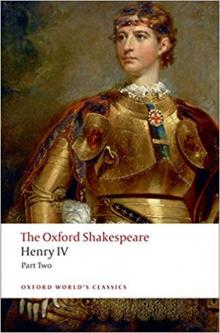 The Oxford Shakespeare: Henry IV, Part 2 (Oxford World's Classics)
The Oxford Shakespeare: Henry IV, Part 2 (Oxford World's Classics)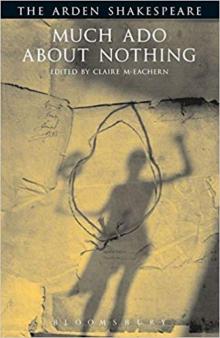 Much Ado About Nothing (Arden Shakespeare: Third Series)
Much Ado About Nothing (Arden Shakespeare: Third Series) All's Well That Ends Well
All's Well That Ends Well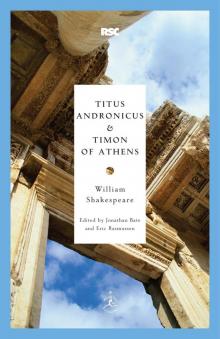 Titus Andronicus & Timon of Athens
Titus Andronicus & Timon of Athens Richard III (Modern Library Classics)
Richard III (Modern Library Classics) Coriolanus
Coriolanus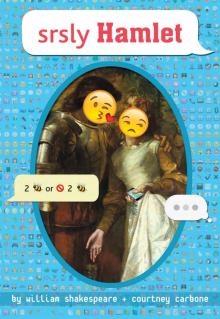 srsly Hamlet (OMG Shakespeare)
srsly Hamlet (OMG Shakespeare)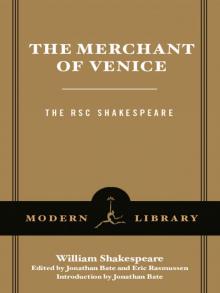 The Merchant of Venice
The Merchant of Venice Richard III
Richard III Richard II
Richard II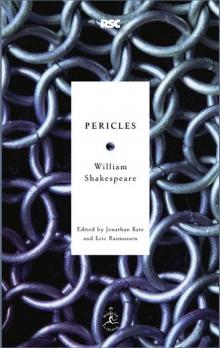 Pericles
Pericles As You Like It
As You Like It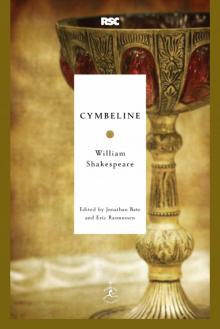 Cymbeline
Cymbeline Alls Wel that ends Well
Alls Wel that ends Well YOLO Juliet
YOLO Juliet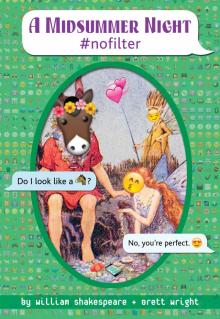 A Midsummer Night #nofilter
A Midsummer Night #nofilter Love's Labour's Lost
Love's Labour's Lost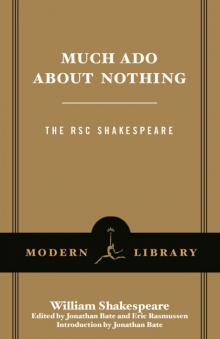 Much Ado About Nothing
Much Ado About Nothing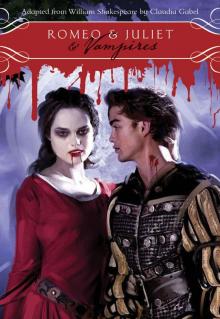 Romeo & Juliet & Vampires
Romeo & Juliet & Vampires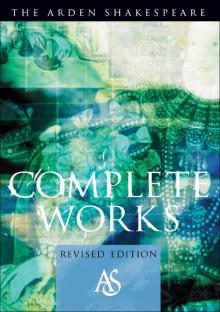 The Arden Shakespeare Complete Works
The Arden Shakespeare Complete Works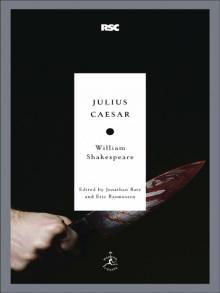 Julius Caesar
Julius Caesar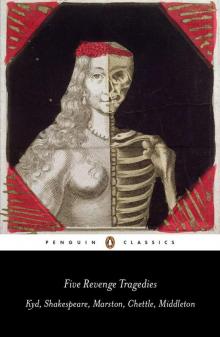 Five Revenge Tragedies: The Spanish Tragedy, Hamlet, Antonio's Revenge, The Tragedy of Hoffman, The Revenger's Tragedy (Penguin Classics)
Five Revenge Tragedies: The Spanish Tragedy, Hamlet, Antonio's Revenge, The Tragedy of Hoffman, The Revenger's Tragedy (Penguin Classics)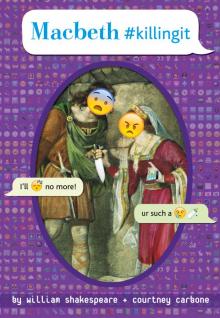 Macbeth #killingit
Macbeth #killingit The Oxford Shakespeare: The Complete Works
The Oxford Shakespeare: The Complete Works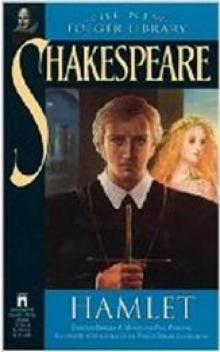 Hamlet, Prince of Denmark (Collins edition)
Hamlet, Prince of Denmark (Collins edition) King John & Henry VIII
King John & Henry VIII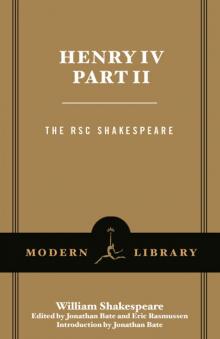 Henry IV, Part 2
Henry IV, Part 2 Complete Plays, The
Complete Plays, The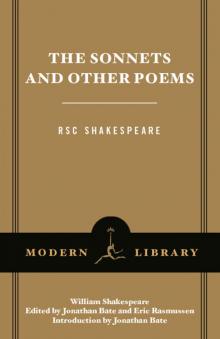 The Sonnets and Other Poems
The Sonnets and Other Poems Antony and Cleopatra
Antony and Cleopatra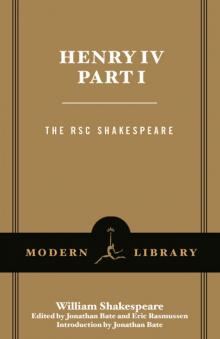 Henry IV, Part 1
Henry IV, Part 1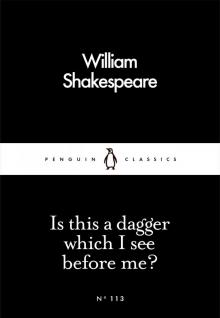 Is This a Dagger Which I See Before Me?
Is This a Dagger Which I See Before Me? The Complete Works of William Shakespeare In Plain and Simple English (Translated)
The Complete Works of William Shakespeare In Plain and Simple English (Translated) The Sonnets
The Sonnets